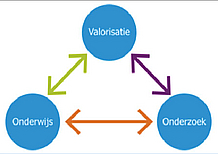Knowledge triangle
It is a basic premise at TU Delft that education, research and valorisation are closely interrelated.
Effective scientific education demands that the very latest insights from research be shared with students. This tends to occur most directly during the MSc and, of course, the PhD phase. At the doctoral level, in particular, interaction between research and education is both intensive and natural.

Even for undergraduates, however, it is extremely important that an affinity with research and its methodology be nurtured. Introducing students to scientific research and methodologies at the earliest possible stage represents a basic pillar of their academic training.
Conversely, education and students have a contribution to make to research. Their creative input and feedback encourages their tutors – who are usually researchers, too – to formulate and explore unexpected lines of research. It is important, therefore, that the teaching environment allow scope for “creative sparks” to jump from student to tutor and vice versa.
The interaction between research and education on the one hand and valorisation on the other is nothing new. Indeed, training professional engineers is a significant act of valorisation in itself.
In this era, the engineers of the future can pursue a valuable supplementary learning objective by taking special modules designed to prepare them for the challenges of entrepreneurship.
The relationship between research and valorisation remains the most highly developed, however. After all, most forms of valorisation – from setting up innovative new companies to securing patents and establishing partnerships with businesses or public bodies – still build directly upon research results.
For TU Delft, encouraging, organising and embedding interaction between education, research and valorisation – what we call the “knowledge triangle” – is an essential part of our purpose as an academic institution.